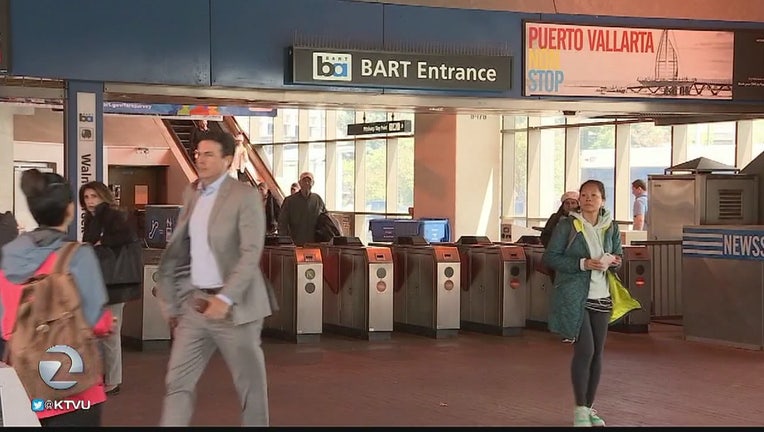BART board sinks anti-panhandling ordinance, approves priority entry pilot program at SFO

BART station
OAKLAND, Calif. - A five-seat majority on BART's board of directors declined to move forward Thursday morning with a request that staff research and draft an ordinance cracking down on panhandlers and performers in the paid areas of the transit system.
Director Debora Allen, who represents four stations in Central Contra Costa County and requested the item be put on the agenda, argued that many of her constituents feel unsafe when asked for money. Especially elderly or disabled people.
BART Police Department Deputy Chief Lance Haight said his officers often get reports of panhandling or solicitation, a broader term which includes busking and dance performances accompanied by a request for donation, but are unable to take action because the activities in question do not violate state penal codes - which primarily involve disorderly conduct or "'unreasonably loud' sound equipment."
The main remedy proposed was an ordinance that would create a new criminal infraction for panhandling or solicitation in paid areas of the
transit system. Director Mark Foley also floated the idea of a permitting system and Director Liz Ames inquired about posting "no panhandling" signs.
In the end, however, there were not enough votes to move forward with restrictions of any kind.
Director Robert Raburn pointed out that a number of outstanding musicians have started their careers busking on BART, citing examples like The California Honeydrops and Oakland's own Fantastic Negrito.
Director Janice Li called crafting an anti-panhandling ordinance a bad use of the board's time and the district's staff resources. She also expressed concern that by authorizing police to crack down on buskers and panhandlers, the increased number of police interactions could be accompanied by an increased number of use-of-force cases.
Li advocated for implementing an ambassador program, in which BART staff would have a visible presence in the stations rather than police, as a
means to address public safety concerns. She also urged the board to focus on other issues like train and station cleanliness, train temperature and
on-time performance.
Directors Lateefah Simon and Rebecca Saltzman cast their lot with Li, as did Board President Bevan Dufty - who argued that much of the day's
discussion was driven by falsehoods surrounding poverty.
"My disgust is that we are pushing such a false issue right now," Dufty said.
"Let's do a better job of addressing what the real problems are," he added.
Ames, Foley and Director John McPartland expressed support for Allen's move to place some kind of restrictions on panhandling in paid areas of the station.
"I think we're hearing that there are five directors who are not interested," Allen said.
She plans to seek additional support from allies on the board and resurrect the matter sometime in 2020.
The board also approved the first step to providing BART passengers traveling to San Francisco International Airport a priority entry line for security screening. The pilot program will depend on "trip verification technology" allowing SFO staff to scan the passenger's clipper card and verify that they arrived on public transportation.
If successful, it could also be considered at Oakland International Airport. The next step is for BART engineers to begin developing the software, but at this time there is no estimated date for project completion.

